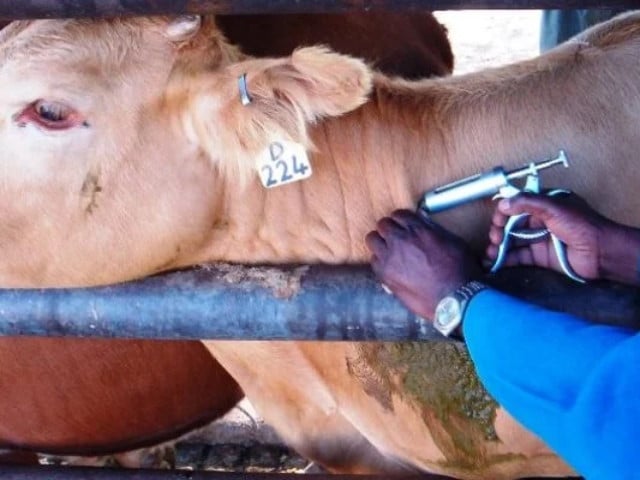Karachi: Animal Experts stressed the need to establish permanent facilities in the sacrificial market and establish permanent structures in the sacrificial market, considering that more than 90% of sacrificial animals come to Karachi from Punjab and Sindh.
Two years ago, an outbreak of skin disease virus (LSDV) killed hundreds of thousands of cattle. They noted that LSDV is still present in Punjab and 100% of animals have not been vaccinated. Although several suspected cases have been reported in Mehar and Dadu, and concerns have been raised in Gadap town, there has been no sign of LSDV in Sindh so far.
Professor Dr Allah Bux Kachiwal, Chairman, Department of Physiology and Biochemistry, Singh Agricultural University, said it is important to start a vaccination program on a large scale and conduct a thorough animal check-up as Eid-Azha approaches. Instead of relying on programs, he advocated the creation of a permanent structure in the offering market. These structures will protect large and small animals from natural disasters such as heavy rains, urban floods, and heat waves.
Kachiwal pointed out the risk associated with disease outbreaks among dairy animals and said that proactive measures are needed. He said the loss of such an animal, which usually takes about three years, cannot be restored.
Diseases that affect cattle and cattle during summer include foot and mouth disease, hemorrhagic disease, septicemia, black quarter, asthma, and many other diseases. Similarly, goat and sheep diseases include enterotoxemia, caprine pleuropneumonia, distemper, PPR (peste des petits ruminants) and others.
Jamil Memon, a veteran farmer and chairman of Sindh Dairy, Animal Husbandry and Animal Husbandry, emphasized the importance of religious sentiments to encourage people to buy animals despite high prices. He said the prices of goats and sheep are around 40,000 and 30,000 respectively, while cattle are between 150,000 and 350,000, and the market price is likely to rise again.
He said that about 80% of the animals came from Punjab, while the rest came from inside Sindh and Balochistan, contributing to the port city’s sacrificial market. “Thank God Almighty, now we are not afraid of disease because the animals are healthy and healthy in Sindh,” he said thankfully.
Dr Hizbullah Bhutto, Director General of Animal Husbandry Department, Sindh, informed that the group has been active since the outbreak of Crimean-Congo hemorrhagic fever virus in Balochistan two months ago. Vaccination against potential diseases continues in the province, with about 300,000 goats and sheep being vaccinated in Tharparkar, meeting the daily consumption needs of Karachi and Hyderabad. Another 250,000 vaccines will be administered in the region soon.
Farmers and traders said they plan to set up vaccination camps in border areas or entry points of Sindh like Hub, Ghotki, Kashmore, Jacobabad and others while transporting their livestock from Punjab and Baluchistan to Sindh. The group will have vaccination records and unvaccinated animals will be vaccinated immediately.







